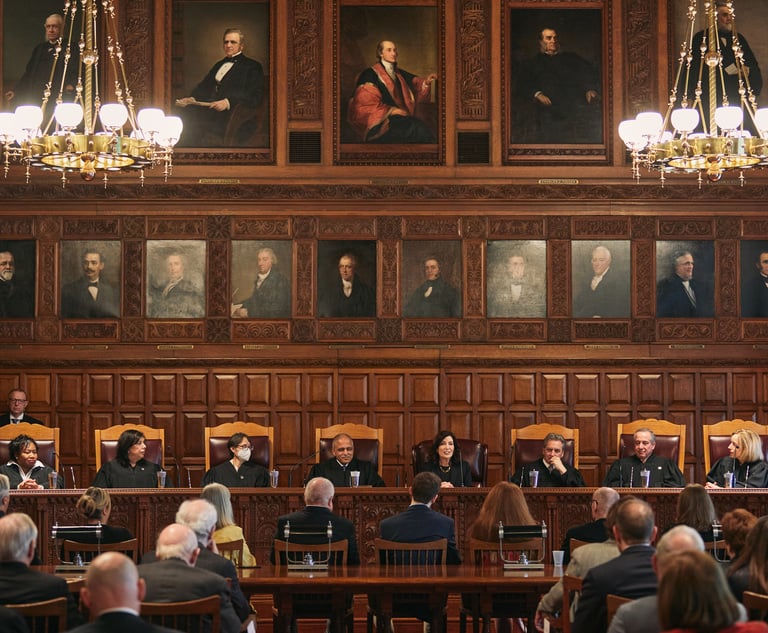Upstate Town and Village Justice Is Censured for Misconduct
Joan Kline, a justice of the Guilford Town Court and a former justice of the Oxford Town and Village Courts, located in Chenango County, has agreed to the censure.
January 08, 2018 at 06:10 PM
4 minute read

A Chenango County town and village justice accused of judicial misconduct—including failing to inform defendants of their right to counsel and acting in an “injudicious” manner that appeared intended to coerce defendants into pleading guilty—has been censured by the state Commission on Judicial Conduct.
Joan Kline, a justice of the Guilford Town Court and a former justice of the Oxford Town and Village Courts, located in Chenango County, has agreed to the censure, which was detailed in a 28-page determination issued by the commission that included recitations of behavior Kline now “understands” she must not engage in again.
“It is a judge's duty to ensure that fundamental safeguards are met, such as advising litigants of the right to counsel,” said commission administrator and counsel Robert Tembeckjian in a statement Monday announcing the censure.
He added, “A judge must also ensure that standards of fairness are upheld, such as deciding every case on the merits. Judge Kline failed to meet these and other ethical mandates, but to her credit she admitted it and has taken steps to improve.”
Kline, a nonattorney who began in Guilford as a town court justice in 2008 and whose latest position in Oxford ended Dec. 31, was accused of a range of misconduct that also included the unauthorized destruction of court records. She was also reprimanded for holding simultaneous positions that could lead to conflicts of interest such as being a court clerk and an acting Village justice in Oxford at the same time. She additionally served on the local fire police squad, the commission pointed out.
But in example after example, in cases that often dealt with motor vehicle and traffic violations and landlord-tenant matters, it was Kline's exchanges with defendants that the commission detailed as out of order and, as stated in the determination, a “significant departure from the high standards of conduct required of every judge.”
In one example, laid out in the commission's Dec. 26, 2017, determination, the commission's clerk wrote that an accused unlicensed driver, Bridgitt Eggleston, “told respondent [Kline] that she was unable to meet with her attorney, Joseph Ermeti, before her appearance, but that he had instructed her to request an adjournment.”
“[Kline] replied that she would do nothing until she heard from Ms. Eggleston's attorney,” the determination said, and then “when Ms. Eggleston asked what would happen if that did not occur that day, respondent said, 'then that means he is not your attorney and you will have to answer this.' Respondent did not adjourn Ms. Eggleston's case.”
“In Drapaniotis v. Coffyn, respondent [Kline] provided advice to and engaged in ex parte conversations with the landlords about the substance of the grounds for eviction, without disclosing to the tenant the substance of such ex parte communications or offering to recuse herself as a result of such ex parte communications,” the determination said in another example.
And in yet another one, it said that “in Hills v. DeMorier, respondent threatened to incarcerate the tenant if he failed to make timely payment of the amount respondent awarded to the landlord.”
In ruling to censure Kline, which the commission has said is the most severe sanction it can issue short of removal, the group noted that “informing defendants of the right to counsel is one of a judge's most important responsibilities at an arraignment, and the failure to do so cannot be excused even in isolated instances.”
It also found that the totality of Kline's misconduct “reflects adversely on the judiciary as a whole,” while it was not “truly egregious,” which may have led to a removal from office.
Kline was represented by Scott Clippinger, of Clippinger Law Offices, in Norwich. Clippinger could not be reached for comment.
The commission was represented by Tembeckjian, administrator and counsel to the commission, along with Cathleen Cenci, deputy administrator in charge of the commission's Albany office, and staff attorney S. Peter Pedrotty.
The commission is a state agency that has been investigating complaints of judicial misconduct since 1978. It gets some 1,900 complaints about judges each year and typically determines to investigate between 175 and 200 of them, Tembeckjian has said. Since 1978, the commission has issued 268 determinations of admonition against state judges, 321 determinations of censure and 170 determinations of removal.
This content has been archived. It is available through our partners, LexisNexis® and Bloomberg Law.
To view this content, please continue to their sites.
Not a Lexis Subscriber?
Subscribe Now
Not a Bloomberg Law Subscriber?
Subscribe Now
NOT FOR REPRINT
© 2025 ALM Global, LLC, All Rights Reserved. Request academic re-use from www.copyright.com. All other uses, submit a request to [email protected]. For more information visit Asset & Logo Licensing.
You Might Like
View All
Tensions Run High at Final Hearing Before Manhattan Congestion Pricing Takes Effect
4 minute read
Lisa Zornberg, Former Adams Chief Counsel, Moves to Morvillo Abramowitz
5 minute readTrending Stories
- 1Meta Pulls Plug on DEI Programs
- 2On the Move and After Hours: Meyner and Landis; Cooper Levenson; Ogletree Deakins; Saiber
- 3State Budget Proposal Includes More Money for Courts—for Now
- 4$5 Million Settlement Reached With Stone Academy
- 5$15K Family Vacation Turned 'Colossal Nightmare': Lawsuit Filed Against Vail Ski Resorts
Who Got The Work
Michael G. Bongiorno, Andrew Scott Dulberg and Elizabeth E. Driscoll from Wilmer Cutler Pickering Hale and Dorr have stepped in to represent Symbotic Inc., an A.I.-enabled technology platform that focuses on increasing supply chain efficiency, and other defendants in a pending shareholder derivative lawsuit. The case, filed Oct. 2 in Massachusetts District Court by the Brown Law Firm on behalf of Stephen Austen, accuses certain officers and directors of misleading investors in regard to Symbotic's potential for margin growth by failing to disclose that the company was not equipped to timely deploy its systems or manage expenses through project delays. The case, assigned to U.S. District Judge Nathaniel M. Gorton, is 1:24-cv-12522, Austen v. Cohen et al.
Who Got The Work
Edmund Polubinski and Marie Killmond of Davis Polk & Wardwell have entered appearances for data platform software development company MongoDB and other defendants in a pending shareholder derivative lawsuit. The action, filed Oct. 7 in New York Southern District Court by the Brown Law Firm, accuses the company's directors and/or officers of falsely expressing confidence in the company’s restructuring of its sales incentive plan and downplaying the severity of decreases in its upfront commitments. The case is 1:24-cv-07594, Roy v. Ittycheria et al.
Who Got The Work
Amy O. Bruchs and Kurt F. Ellison of Michael Best & Friedrich have entered appearances for Epic Systems Corp. in a pending employment discrimination lawsuit. The suit was filed Sept. 7 in Wisconsin Western District Court by Levine Eisberner LLC and Siri & Glimstad on behalf of a project manager who claims that he was wrongfully terminated after applying for a religious exemption to the defendant's COVID-19 vaccine mandate. The case, assigned to U.S. Magistrate Judge Anita Marie Boor, is 3:24-cv-00630, Secker, Nathan v. Epic Systems Corporation.
Who Got The Work
David X. Sullivan, Thomas J. Finn and Gregory A. Hall from McCarter & English have entered appearances for Sunrun Installation Services in a pending civil rights lawsuit. The complaint was filed Sept. 4 in Connecticut District Court by attorney Robert M. Berke on behalf of former employee George Edward Steins, who was arrested and charged with employing an unregistered home improvement salesperson. The complaint alleges that had Sunrun informed the Connecticut Department of Consumer Protection that the plaintiff's employment had ended in 2017 and that he no longer held Sunrun's home improvement contractor license, he would not have been hit with charges, which were dismissed in May 2024. The case, assigned to U.S. District Judge Jeffrey A. Meyer, is 3:24-cv-01423, Steins v. Sunrun, Inc. et al.
Who Got The Work
Greenberg Traurig shareholder Joshua L. Raskin has entered an appearance for boohoo.com UK Ltd. in a pending patent infringement lawsuit. The suit, filed Sept. 3 in Texas Eastern District Court by Rozier Hardt McDonough on behalf of Alto Dynamics, asserts five patents related to an online shopping platform. The case, assigned to U.S. District Judge Rodney Gilstrap, is 2:24-cv-00719, Alto Dynamics, LLC v. boohoo.com UK Limited.
Featured Firms
Law Offices of Gary Martin Hays & Associates, P.C.
(470) 294-1674
Law Offices of Mark E. Salomone
(857) 444-6468
Smith & Hassler
(713) 739-1250








